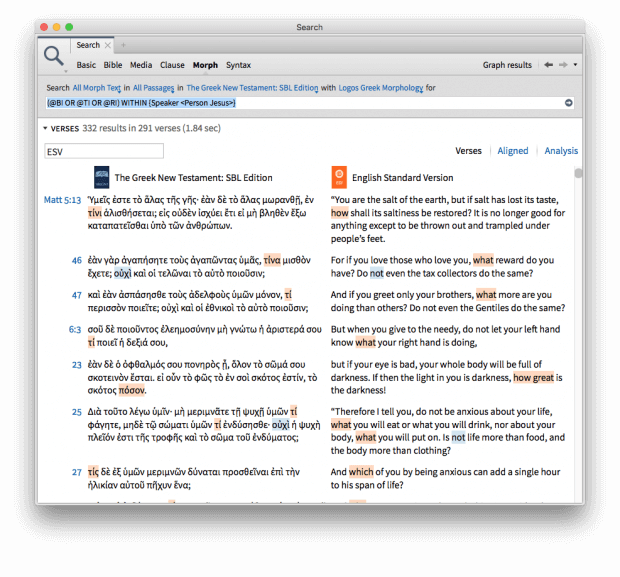Sometimes you have this question about the Bible, this burning desire to know. And you want to know what the whole thing has to say about that question. Ideally, you’d have a year to read through the whole of Scripture, marking it up and taking notes on every passage that spoke to your question.
And I say, don’t give up that ideal. Go for it. But reserve that method for only the most important questions. For others, use the search tools in Logos to “read” all of Scripture for you.
For example, a student of the Bible wrote in to the Logos Pro team because she wanted to know something, something it would take many hours reading through all 89 chapters of the Gospels to find out:
Can Logos Bible Software search for all the questions asked by Jesus?
Why did she want to know this? I don’t know. Perhaps she wanted to dig into the interpersonal skills of Jesus as recorded in the Gospels. Or maybe she’d been reading Randy Newman’s Questioning Evangelism: Engaging People’s Hearts the Way Jesus Did, and he wanted to see the data firsthand. Or maybe her four-year-old asked her one of those unexpectedly insightful questions that only kids can come up with.
In any case, there is an answer to this Bible student’s question.
The Logos Pros replied,
Here’s how I would do this: I would use a Morph Search to look for Adverb Interrogatives (@BI), Participle Interrogatives (@TI), or Pronoun Interrogatives (@RI), WITHIN the speech of Jesus.
So the full query would look like this:
(@BI OR @TI OR @RI) WITHIN {Speaker <Person Jesus>}
(Click here to run the search in Logos. Faithlife’s own Phil Gons has come up with an alternate method which is more precise but a bit more difficult. It employs user-generated labels which you can download in the “documents” tab in this Faithlife group.)
As you can see from the screenshot, this search finds over 300 results, though some of those are interrogative pronouns which aren’t actually asking a question.
I don’t know why this Logos user asked this question, but I know what I got out of it. When you think, in general, about the way Jesus asked questions, you may indeed imagine him in evangelistic situations—like with the woman at the well in John 4. But actually, John 4 doesn’t show up in this search, because Jesus never asked her a question—she’s the one who did the asking. “Where do you get that living water?”
But here’s what I noticed: Jesus asked a lot of rhetorical questions. In Matthew 5, for example, every question he asked was rhetorical. It was driving to a point, not necessarily seeking information. When he asked, “Which of you by being anxious can add a single hour to his span of life?”, he did not expect the answer, “Me!”—or the answer “Not me!” He expected a thoughtful nod.
People do a lot of things with their questions beyond getting information. Questions can be a softer way of stating something—in a way that isn’t as grating as, like, uptalk?
Jesus was 100% divine. Orthodox Trinitarian doctrine says he was also 100% human. He used language the way we all do. Sometimes odd, one-off searches in Logos can put that fact in relief and make it stand out.







